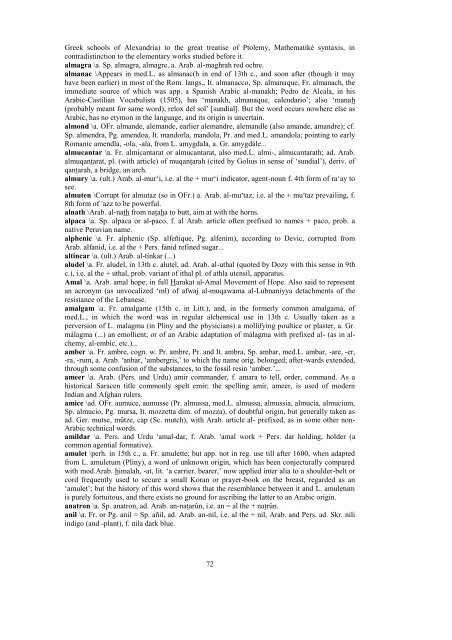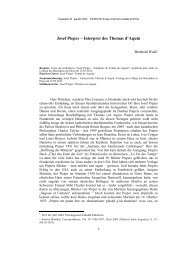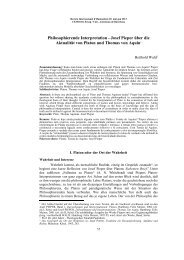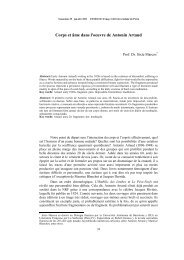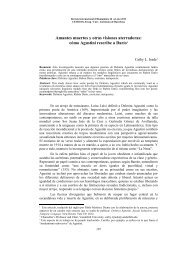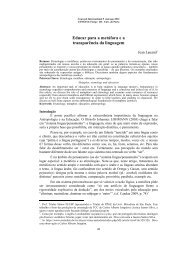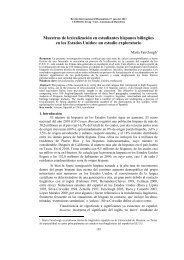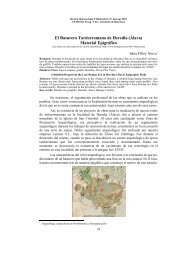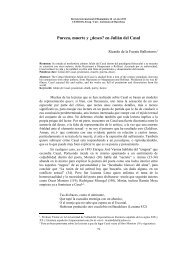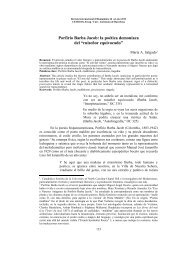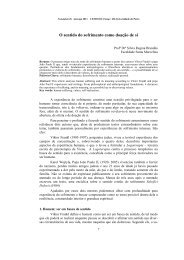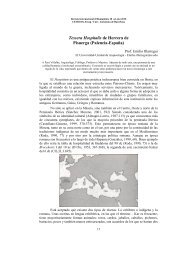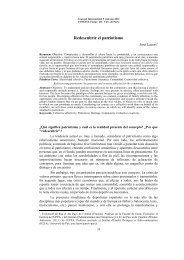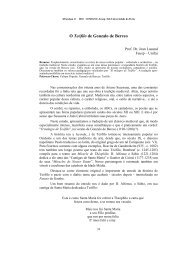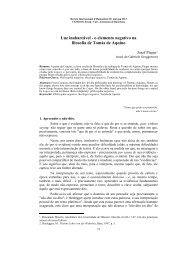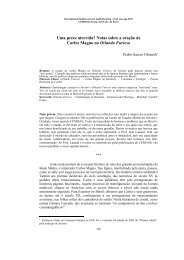Palavras de Origem Árabe Dicionarizadas em Inglês e em Espanhol
Palavras de Origem Árabe Dicionarizadas em Inglês e em Espanhol
Palavras de Origem Árabe Dicionarizadas em Inglês e em Espanhol
You also want an ePaper? Increase the reach of your titles
YUMPU automatically turns print PDFs into web optimized ePapers that Google loves.
Greek schools of Alexandria) to the great treatise of Ptol<strong>em</strong>y, Math<strong>em</strong>atiké syntaxis, in<br />
contradistinction to the el<strong>em</strong>entary works studied before it.<br />
almagra \a. Sp. almagra, almagre, a. Arab. al-maghrah red ochre.<br />
almanac \Appears in med.L. as almanac(h in end of 13th c., and soon after (though it may<br />
have been earlier) in most of the Rom. langs., It. almanacco, Sp. almanaque, Fr. almanach, the<br />
immediate source of which was app. a Spanish Arabic al-manakh; Pedro <strong>de</strong> Alcala, in his<br />
Arabic-Castilian Vocabulista (1505), has ‘manakh, almanaque, calendario’; also ‘manah<br />
(probably meant for same word), relox <strong>de</strong>l sol’ [sundial]. But the word occurs nowhere else as<br />
Arabic, has no etymon in the language, and its origin is uncertain.<br />
almond \a. OFr. alman<strong>de</strong>, al<strong>em</strong>an<strong>de</strong>, earlier al<strong>em</strong>andre, al<strong>em</strong>andle (also aman<strong>de</strong>, amandre); cf.<br />
Sp. almendra, Pg. amendoa, It. mandorla, mandola, Pr. and med.L. amandola; pointing to early<br />
Romanic amendla, -ola, -ala, from L. amygdala, a. Gr. amygdále...<br />
almucantar \a. Fr. almicantarat or almucantarat, also med.L. almi-, almucantarath; ad. Arab.<br />
almuqantarat, pl. (with article) of muqantarah (cited by Golius in sense of ‘sundial’), <strong>de</strong>riv. of<br />
qantarah, a bridge, an arch.<br />
almury \a. (ult.) Arab. al-mur‘i, i.e. al the + mur‘i indicator, agent-noun f. 4th form of ra‘ay to<br />
see.<br />
almuten \Corrupt for almutaz (so in OFr.) a. Arab. al-mu , taz, i.e. al the + mu , taz prevailing, f.<br />
8th form of , azz to be powerful.<br />
alnath \Arab. al-nath from nataha to butt, aim at with the horns.<br />
alpaca \a. Sp. alpaca or al-paco, f. al Arab. article often prefixed to names + paco, prob. a<br />
native Peruvian name.<br />
alphenic \a. Fr. alphenic (Sp. alfeñique, Pg. alfenim), according to Devic, corrupted from<br />
Arab. alfanid, i.e. al the + Pers. fanid refined sugar...<br />
altincar \a. (ult.) Arab. al-tinkar (...)<br />
alu<strong>de</strong>l \a. Fr. alu<strong>de</strong>l, in 13th c. alutel, ad. Arab. al-uthal (quoted by Dozy with this sense in 9th<br />
c.), i.e. al the + uthal, prob. variant of ithal pl. of athla utensil, apparatus.<br />
Amal \a. Arab. amal hope; in full Harakat al-Amal Mov<strong>em</strong>ent of Hope. Also said to represent<br />
an acronym (as unvocalized ‘ml) of afwaj al-muqawama al-Lubnaniyya <strong>de</strong>tachments of the<br />
resistance of the Lebanese.<br />
amalgam \a. Fr. amalgame (15th c. in Litt.), and, in the formerly common amalgama, of<br />
med.L., in which the word was in regular alch<strong>em</strong>ical use in 13th c. Usually taken as a<br />
perversion of L. malagma (in Pliny and the physicians) a mollifying poultice or plaster, a. Gr.<br />
málagma (...) an <strong>em</strong>ollient; or of an Arabic adaptation of málagma with prefixed al- (as in alch<strong>em</strong>y,<br />
al-<strong>em</strong>bic, etc.)...<br />
amber \a. Fr. ambre, cogn. w. Pr. ambre, Pr. and It. ambra, Sp. ambar, med.L. ambar, -are, -er,<br />
-ra, -rum, a. Arab. , anbar, ‘ambergris,’ to which the name orig. belonged; after-wards exten<strong>de</strong>d,<br />
through some confusion of the substances, to the fossil resin ‘amber.’...<br />
ameer \a. Arab. (Pers. and Urdu) amir comman<strong>de</strong>r, f. amara to tell, or<strong>de</strong>r, command. As a<br />
historical Saracen title commonly spelt <strong>em</strong>ir; the spelling amír, ameer, is used of mo<strong>de</strong>rn<br />
Indian and Afghan rulers.<br />
amice \ad. OFr. aumuce, aumusse (Pr. almussa, med.L. almussa, almussia, almucia, almucium,<br />
Sp. almucio, Pg. mursa, It. mozzetta dim. of mozza), of doubtful origin, but generally taken as<br />
ad. Ger. mutse, mütze, cap (Sc. mutch), with Arab. article al- prefixed, as in some other non-<br />
Arabic technical words.<br />
amildar \a. Pers. and Urdu , amal-dar, f. Arab. , amal work + Pers. dar holding, hol<strong>de</strong>r (a<br />
common agential formative).<br />
amulet \perh. in 15th c., a. Fr. amulette; but app. not in reg. use till after 1600, when adapted<br />
from L. amuletum (Pliny), a word of unknown origin, which has been conjecturally compared<br />
with mod.Arab. himalah, -at, lit. ‘a carrier, bearer,’ now applied inter alia to a shoul<strong>de</strong>r-belt or<br />
cord frequently used to secure a small Koran or prayer-book on the breast, regar<strong>de</strong>d as an<br />
‘amulet’; but the history of this word shows that the res<strong>em</strong>blance between it and L. amuletum<br />
is purely fortuitous, and there exists no ground for ascribing the latter to an Arabic origin.<br />
anatron \a. Sp. anatron, ad. Arab. an-natarûn, i.e. an = al the + natrûn.<br />
anil \a. Fr. or Pg. anil = Sp. añil, ad. Arab. an-nil, i.e. al the + nil, Arab. and Pers. ad. Skr. nili<br />
indigo (and -plant), f. nila dark blue.<br />
72


